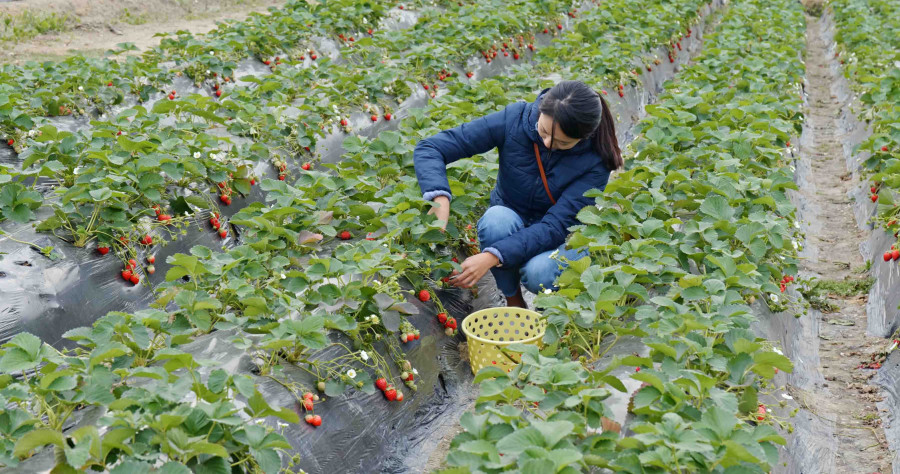Money
UK may not hire Nepali seasonal workers this year
The organisations licensed to recruit workers have decided not to do so because of controversies over illegal fees and abscondment, insiders say.
Pawan Pandey
Kumar Lama has applied for seasonal work on a fruit farm in the United Kingdom, but he doesn't look like getting hired this year. The organisations licensed to recruit foreign workers have decided not to do so this year because of controversies over illegal fees and abscondment, insiders said.
Lama is from Sindhupalchok and currently lives in Budhanilkantha, Kathmandu.
“There are six Seasonal Workers' Scheme Operators who hold a United Kingdom Home Office sponsor licence to recruit seasonal workers from anywhere in the world to work under a horticulture or poultry Seasonal Workers' Visa in the UK,” David Camp, chairman of the Association of Labour Providers, told the Post in an email recently.
“All have indicated their decision not to conduct any new recruitment from Nepal in 2023.”
Established in 2004 at the instigation of the UK government, the Association of Labour Providers is a not-for-profit trade association promoting responsible recruitment.
The scheme operators are individual private companies who make their own decisions as to which country they should recruit from, according to Camp.
Four of the operators–AG Recruitment and Management, Concordia, Fruitful Jobs and HOPS Labour Solutions–hire workers for the horticulture sector, and RE Recruitment carries out recruitment for the poultry sector. Pro-Force hires workers for both sectors.
AG, Concordia and Pro-Force have hired Nepali workers in the past.
“Good jobs are short in Nepal, and six months' employment in a country like the UK is obviously a terrific opportunity for us,” said Lama. “But what can we do if they have decided not to hire us? It is sad.”
The UK has emerged as an important destination for Nepali seasonal farm workers in recent years.
In 2019, the UK government launched the Seasonal Workers Pilot which has now been extended until 2024. According to a notice published by the UK government, 45,000 visas are available in horticulture businesses in 2023.
The Nepal Labour Migration Report 2022 said that 1,124 Nepalis received UK visas for temporary work from 2019 to the first quarter of 2022, putting the country in the second spot after India as the largest receiver of UK visas among South Asian countries in recent years.
The Russia-Ukraine war that began last February severely hit labour market flows from Ukraine and other Eastern European countries to the UK, resulting in a steep spike in the recruitment of Nepali workers.
According to the UK’s Home Office immigration statistics, 2,072 Nepalis got seasonal work visas in the first half of 2022 compared to 456 in 2021.
Seasonal work in the horticulture sector in the UK consists of picking fruits, vegetables and flowers for six months.
Workers have to pay around Rs41,843 (equivalent to 259 pounds) as an application fee besides spending for their visa and two-way ticket. They require a certificate of sponsorship, which is a reference number which holds information about the job and personal details.
However, the scheme became controversial last year after multiple reports of workers paying exorbitant recruitment fees to secure jobs, and workers not being provided employment for the entire six-month period came to the surface.
An unnamed Nepali worker recruited by AG Recruitment and Management told the Post that some of his fellow workers had paid as much as Rs1.2 million to Nepali middlemen to get the job.
A farm worker can save around Rs200,000 per month, workers said.
The workers who supposedly paid illegal fees refused to talk to the Post.
Illegal recruitment fees, high abscondment rate in the last season, and poor coordination and lack of support from Nepal’s Labour Ministry are the major reasons for stopping recruitment from Nepal, according to Camp.
“Each Scheme Operator will have its own reasons for deciding which countries to recruit from,” said Camp.
Though seasonal workers have to return to the source country after the completion of the six-month period, many overstay or migrate to other countries, according to several workers the Post talked to.
“Many workers leave work before the completion of their contract to migrate to other countries, mostly to Portugal,” they said.
Nepal’s poor practices in recruitment for seasonal work became an issue in the UK, according to Jeevan Baniya, assistant director at the Centre for Study of Labour and Mobility, Social Science Baha, a non-profit organisation involved in research in the social sciences in Nepal.
“Parliamentarians and human rights activists in the UK have continuously raised the issue of forced labour, deception and high recruitment fees in the seasonal work scheme,” said Baniya. “It has created pressure upon the recruiters to address such issues.”
Uncertainty remains regarding the hiring of former workers.
“If the seasonal work scheme operators have decided not to source any workers from Nepal, and that includes not bringing back the old workers, many of whom didn’t get six months of work last year and were promised 2023 work to pay off their past debts, it really would be terrible,” said Andy Hall, a Kathmandu-based migrant workers' rights specialist.
“Seasonal work in the UK is a very lucrative market for Nepalis, and it’s a big loss for Nepal. This result reflects poorly on both the UK and Nepal governments and their failed migration management and governance systems generally,” said Hall.
Camp said the individual Scheme Operator businesses will be in direct contact with all those workers from any country who worked for them during the last season as to whether there is an opportunity to return this season.
“That is a matter between each business and each individual depending on factors that include how well that worker performed last season,” said Camp. “There will be an established direct communication channel between the worker and the Scheme Operator.”
Along with the seasonal work scheme, Baniya says, the hiring of Nepali nurses to work in the UK has also become engulfed in controversy.




 11.12°C Kathmandu
11.12°C Kathmandu













